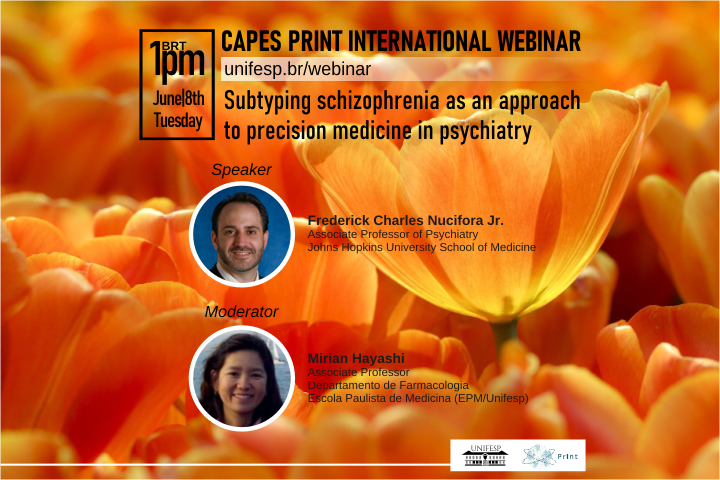On June 8, 2021 at 1 pm (BRT)

Speaker: Frederick Charles Nucifora Jr., associate professor of Psychiatry, Johns Hopkins University School of Medicine
Moderator: Mirian Hayashi, associate professor, Department of Pharmacology, Escola Paulista de Medicina - Unifesp
Dr. Frederick Nucifora is an assistant professor of psychiatry and behavioral sciences at the Johns Hopkins University School of Medicine. His areas of clinical expertise include adult psychiatry.Dr. Nucifora earned his medical degree from the Philadelphia College of Osteopathic Medicine. He completed his residency at The Johns Hopkins Hospital’s Department of Psychiatry and Behavioral Science, where he also performed a fellowship in psychiatry. Dr. Nucifora is board certified by the American Board of Psychiatry & Neurology.
His research interests include the molecular and biological etiology of psychiatric illnesses, including schizophrenia and Huntington’s disease.
Link to watch the event: unifesp/webinar
Speaker further information can be found at: link
Schizophrenia, characterized by positive and negative symptoms and cognitive deficits, is a heterogeneous disorder in clinical presentation and course, and likely results from multiple mechanisms. Although our understanding of the genetics related to schizophrenia has advanced, the mechanisms of the disease are still poorly understood and are likely to be diverse. The lack of clear biomarkers and novel treatments likely stem from this heterogeneity, i.e., mixing together of multiple pathophysiological disease mechanisms. Therefore, differentiating subtypes of schizophrenia may be valuable in understanding the mechanisms underlying disease phenotypes. One approach to subtyping schizophrenia is by describing clinical symptoms and natural history. Treatment resistant schizophrenia (TRS), is one possible subtype that will be discussed in this talk. By stratifying patients based on response to treatment, clinical subtypes of schizophrenia can then be explored at the pathological and molecular level. An alternative approach to improving patient subtyping is to identify pathological processes present in subsets of patients. This could provide more homogeneous subpopulations of patients, and increase the likelihood of identifying biomarkers, understanding the pathways, and clinical symptoms seen in this subset of mental illness. In this talk, I will present data demonstrating pathological abnormalities such as protein insolubility/aggregation in a subset of patients with schizophrenia that can be identified in biospecimens and then correlated to specific clinical subtypes. Overall, these approaches can help establish a framework for precision medicine in psychiatric care, maximizing the likelihood of treatments that directly benefit each individual patient.


